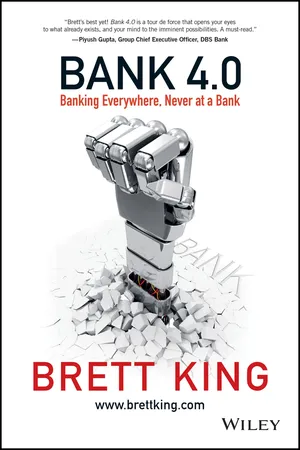
- English
- ePUB (mobile friendly)
- Available on iOS & Android
About this book
Winner ofbest book by a foreign author (2019) at the Business Book of the Year Award organised by PwC Russia
The future of banking is already here — are you ready?
Bank 4.0 explores the radical transformation already taking place in banking, and follows it to its logical conclusion. What will banking look like in 30 years? 50 years? The world's best banks have been forced to adapt to changing consumer behaviors; regulators are rethinking friction, licensing and regulation; Fintech start-ups and tech giants are redefining how banking fits in the daily life of consumers. To survive, banks are having to develop new capabilities, new jobs and new skills. The future of banking is not just about new thinking around value stores, payment and credit utility — it's embedded in voice-based smart assistants like Alexa and Siri and soon smart glasses which will guide you on daily spending and money decisions. The coming Bank 4.0 era is one where either your bank is embedded in your world via tech, or it no longer exists.
In this final volume in Brett King's BANK series, we explore the future of banks amidst the evolution of technology and discover a revolution already at work. From re-engineered banking systems, to selfie-pay and self-driving cars, Bank 4.0 proves that we're not on Wall Street anymore. Bank 4.0 will help you:
- Understand the historical precedents that flag a fundamental rethinking in banking
- Discover low-friction, technology experiences that undermine the products we sell today
- Think through the evolution of identity, value and assets as cash and cards become obsolete
- Learn how Fintech and tech "disruptors" are using behaviour, psychology and technology to reshape the economics of banking
- Examine the ways in which blockchain, A.I., augmented reality and other leading-edge tech are the real building blocks of the future of banking systems
If you look at individual technologies or startups disrupting the space, you might miss the biggest signposts to the future and you might also miss that most of we've learned about banking the last 700 years just isn't useful.
When the biggest bank in the world isn't any of the names you'd expect, when branch networks are a burden not an asset, and when advice is the domain of Artificial Intelligence, we may very well have to start from scratch. Bank 4.0 takes you to a world where banking will be instant, smart and ubiquitous, and where you'll have to adapt faster than ever before just to survive. Welcome to the future.
Frequently asked questions
- Essential is ideal for learners and professionals who enjoy exploring a wide range of subjects. Access the Essential Library with 800,000+ trusted titles and best-sellers across business, personal growth, and the humanities. Includes unlimited reading time and Standard Read Aloud voice.
- Complete: Perfect for advanced learners and researchers needing full, unrestricted access. Unlock 1.4M+ books across hundreds of subjects, including academic and specialized titles. The Complete Plan also includes advanced features like Premium Read Aloud and Research Assistant.
Please note we cannot support devices running on iOS 13 and Android 7 or earlier. Learn more about using the app.
Information
Part 03
Why FinTech companies are proving banks aren’t necessary
- 6 FinTech and TechFin: Friend or Foe?
- 7 The Role of AI in Banking
- 8 The Universal Experience
6
FinTech and TechFin: Friend or Foe?
As […] technologies develop and season, they’re going to create a totally different way of doing banking and financial services. Now we will see the possibility—not necessarily the probability—of what we call a “Kodak moment”, where increasingly banks become irrelevant to their customers.
—Antony Jenkins, Former CEO of Barclays,
founder of FinTech startup 10x Future Technologies
I made a bet [with the CEO of Walmart]: in 10 years we’ll be bigger than Walmart, based on the sales. Because if you want to have 10,000 new customers, you have to build a new warehouse and this and that. For me?...Two servers.—Jack Ma, Founder of Alibaba,
speaking at the 2015 World Economic Forum

(Image credit: WEF).
“For me? Two servers”
Digital only banks have seen greater take up outside Hong Kong. For example, UK regulators have encouraged the development of challenger banks as a way of bolstering competition in the sector. Meanwhile, incumbent banks in Hong Kong have been much slower to close physical branches than rivals because of the high profitability of in...
Table of contents
- Cover
- Title Page
- Copyright
- Dedication
- Preface
- Acknowledgements
- Part 01 Bank 2050
- Part 02 Banking reimagined for a real-time world
- Part 03 Why FinTech companies are proving banks aren’t necessary
- Part 04 Which banks survive, which don’t
- Glossary
- About Brett King
- End User License Agreement